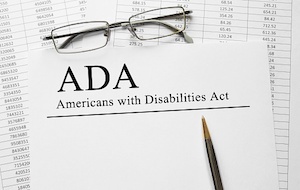 Learning the Americans with Disabilities Act definition and navigating employment law is critical to avoiding legal woes. Many employers aren’t sure what these federal laws entail or whether they apply to their business, so we’re going to break down what you need to know.
Learning the Americans with Disabilities Act definition and navigating employment law is critical to avoiding legal woes. Many employers aren’t sure what these federal laws entail or whether they apply to their business, so we’re going to break down what you need to know.
The Americans with Disabilities Act Definition and Other Resources for Small Businesses
Americans with Disabilities Act Definition
Title I of the Americans with Disabilities Act prohibits private employers, state and local governments, employment agencies and labor unions from discriminating against qualified individuals with disabilities in job application procedures, hiring, firing, advancement, compensation, job training, and other terms, conditions and privileges of employment. The purpose of the law is to make sure that people with disabilities have the same rights and opportunities as everyone else. The ADA gives civil rights protections to individuals with disabilities similar to those provided to individuals on the basis of race, color, sex, national origin, age and religion. It guarantees equal opportunity for individuals with disabilities in public accommodations, employment, transportation, state and local government services, and telecommunications.
The ADA covers employers with 15 or more employees. An individual with a disability is a person who:
- Has a physical or mental impairment that substantially limits one or more major life activity
- Has a record of such an impairment
- Is regarded as having such an impairment
Americans with Disabilities Act Definition: Reasonable Accommodation
An employer is required to make a reasonable accommodation to the known disability of a qualified applicant or employee if it would not impose an "undue hardship" on operations. Reasonable accommodations are adjustments or modifications to enable people with disabilities to enjoy equal employment opportunities.
In addition to actions that would result in undue hardship, you do not have to do any of the following:
- Provide an employee with an adjustment or modification that would assist the individual both on and off the job, such as a prosthetic limb, wheelchair or eyeglasses
- Remove or alter a job's essential functions
- Lower production or performance standards
- Excuse violations of conduct rules necessary for the operation of your business
Accommodations vary depending upon the needs of the individual applicant or employee. Not all people with disabilities, even those with the same disability, will require the same accommodation. A qualified employee or applicant with a disability is an individual who, with or without reasonable accommodation, can perform the essential functions of the job in question. Reasonable accommodation may include:
- Making existing facilities readily accessible to and usable by persons with disabilities
- Job restructuring, work schedule modification, reassignment to a vacant position
- Acquiring or modifying equipment or devices, adjusting or modifying examinations, training materials, or policies, and providing qualified readers or interpreters
After the type of accommodation has been determined, the employer should document the specific accommodations he or she will make.
Americans with Disabilities Act Definition: Undue Hardship
As mentioned earlier, an employer does not have to provide a reasonable accommodation if it imposes an "undue hardship." That’s an action requiring significant difficulty or expense when considered in light of factors such as an employer's size, financial resources and the nature and structure of its operation. In many cases, undue hardship can be difficult to prove.
Let’s say an employee is requesting a special piece of equipment as an accommodation. If the company were a non-profit with limited funds, the Equal Employment Opportunity Commission (EEOC) may consider the request an undue hardship. If an employee who works in a large company with sizeable profits made the same request, the EEOC may see things differently.
Americans with Disabilities Act Definition: Do’s and Don’ts
Do:
- Ask job applicants about their ability to perform specific job functions.
- Ask for documented medical information when workers request work-leave or other accommodations (stay on a need-to-know basis).
- Keep any medical information you learn about an applicant or employee confidential, even if it doesn’t contain a diagnosis or treatment course, like an employee’s request for a reasonable accommodation.
Don’t:
- Ask job applicants about the existence, nature or severity of a disability.
- Extend a job offer conditioned on the results of a medical examination unless it’s required for all employees entering similar jobs (tests for illegal drugs are not subject to the ADA's restrictions on medical examinations).
- Retaliate against an individual for opposing employment practices that discriminate based on disability or for filing a discrimination charge, testifying, or participating in any way in an investigation, proceeding or litigation under the ADA.
For more information on how to accommodate an employee with a disability, view our free webinar called Americans With Disabilities Act Fundamentals.
Partnering with FrankCrum grants you access to a team of HR experts. If you have questions about any HR-related issues, call 1-866-697-6576.



.png)

